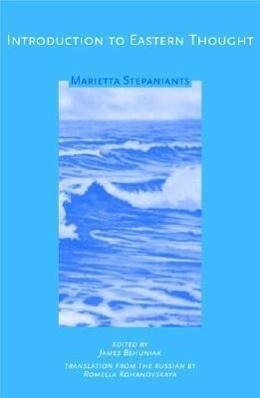
Zustellung: Do, 07.08. - Mi, 13.08.
Versand in 3-4 Wochen
VersandkostenfreiBestellen & in Filiale abholen:
Marietta Stepaniants' introductory text allows a distinctively Eastern way of thinking to come forth. Four interpretive essays open the book showing how Indian, Chinese and Islamic traditions responded to these questions: How did philosophy arise? What is the origin of order in the universe? What is human nature? What is truth ? A fifth, unique, essay shows how Eastern thought has dealt with Western contact in the 19th and 20th centuries. Comparisons within and across traditions makeIntroduction to Eastern Thought an excellent text for students familiar with Western philosophy or beginning philosophy students.
Inhaltsverzeichnis
Part 1 One: Interpretive Essays Chapter 2 1. The Birth of Philosophy Chapter 3 2. The Universe: Its Origins and Structure Chapter 4 3. Human Nature Chapter 5 4 . In Search of the Truth Chapter 6 5. Tradition and Modernity Part 7 Two: Sources Chapter 8 6. Indian Tradition Chapter 9 The Svetasvatara-upanisad Chapter 10 The Bhagavadgita Chapter 11 The Questions of King Milinda Chapter 12 The Acaranga Sutra Chapter 13 The Sarva-Darsana-Samgraha Chapter 14 Isvarakrsna's Samkhyarika Chapter 15 The Yoga Vasistha Chapter 16 The Nyaya-Sutras of Vatasyayana Chapter 17 The Vaisesika-Sutras of Kanada Chapter 18 The Brahma-Sutra-Bhasya of Sankara Chapter 19 The Common Bases of Hinduism Chapter 20 7. Chinese Tradition Chapter 21 Analects Chapter 22 The Book of Mencius Chapter 23 Tao Te Ching Chapter 24 ChuangTzu Chapter 25 Universal Love Chapter 26 The Recorded Conversations of Zen Master I-Hsuan Chapter 27 Fragments from the Complete Works Chapter 28 Inquiry on the Great Learning Chapter 29 Hsin li-hsueh Chapter 30 8. Muslim Tradition Chapter 31 Risala fi istihsan al-khawd fi 'ilm al-kalam Chapter 32 Fusul al-madani Chapter 33 Danish Nama Chapter 34 Tahafut al-falasifah Chapter 35 Fusus al-hikam Chapter 36 Al-Muqaddimah Chapter 37 The Reconstruction of Religious Thought in Islam
Mehr aus dieser Reihe
Produktdetails
Erscheinungsdatum
07. Mai 2002
Sprache
englisch
Seitenanzahl
320
Reihe
Altamira Press
Autor/Autorin
Marietta Stepaniants
Verlag/Hersteller
Produktart
gebunden
Gewicht
590 g
Größe (L/B/H)
234/156/17 mm
ISBN
9780742504332
Entdecken Sie mehr
Pressestimmen
This volume is a triumph of the spirit of cultural accommodation and inclusiveness that is driving the comparative philosophy movement. And as an internationally renonwed voice in this movement, Marietta Stepanients is singularly equipped in breadth of scholarship and in passion to offer the academy her interpretation of world wisdom. This survey includes both interpretive insight and a rich vein of the original philosophical literature, both context and content. It belongs on the bookshelf of every serious student of world culture. -- Roger T. Ames, professor of philosophy, University of Hawaii Professor Marietta Stepaniants is in many ways uniquely qualified to present non-western philosophical traditions to western students of philosophy. Having authored ten books and edited over twenty volumes in both western and mainly, modern Muslim philosophy, and having spent many months living in nonwestern countries, Stepaniants is widely recognized internationally as one of the most outstanding interpreters of Asian thought. She is able to present extremely difficult ideas, often quite alien to westerners, with clarity and deep understanding. -- Eliot Deutsch, (University of Hawaii) From The Foreword In a time of mounting international conflicts it is inspiring and a breath of fresh air to read this enlightening book by the Russian author well known for her studies of Sufism. Instead of dividing the world into good and evil, Introduction to Eastern Thought acquaints the reader with the rich patrimony of world cultures-from India and Islam to China-from which we still have so much to learn. A particular virtue of the book is that it combines well informed and erudite interpretations with an extensive collection of primary sources. A much-needed contribution to cross-cultural understanding in our troubled world. -- Fred Dallmayr, Packey J. Dee Professor, University of Notre Dame Marietta Stepaniants' Introduction to Eastern Thought raises important questions about the nature of philosophy in the Indian, Chinese, and Islamic traditions. Presenting the distinctive perspective of Russian scholarship, she provides lucid interpretations along with translations of essential primary sources, both medieval and modern. This book is required reading for anyone interested in a truly global concept of philosophy, and it should become the standard reference in courses on world philosophy. -- Carl Ernst, (University of North Carolina)
Bewertungen
0 Bewertungen
Es wurden noch keine Bewertungen abgegeben. Schreiben Sie die erste Bewertung zu "Introduction to Eastern Thought" und helfen Sie damit anderen bei der Kaufentscheidung.














